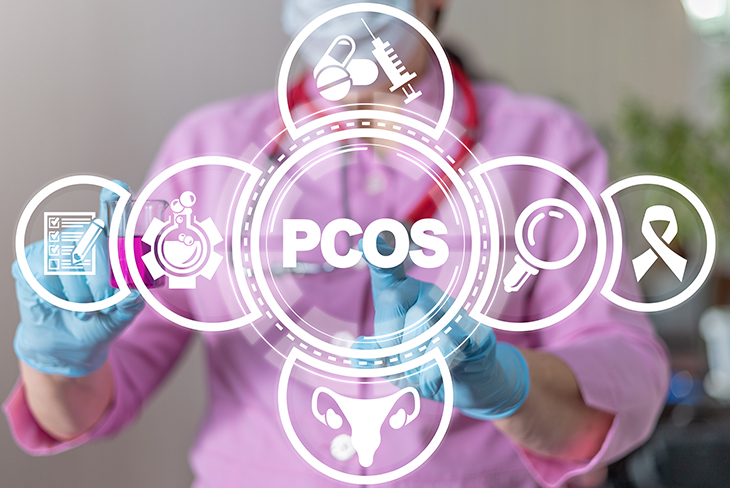PCOS And Fertility: Navigating The Challenges
Stepping into the intricate dance of motherhood many women dream of a smooth journey. But what if the rhythm is interrupted by an unexpected player - PCOS? Polycystic Ovary Syndrome commonly known as PCOS often steps onto the stage introducing a series of challenges in the narrative of fertility. Yet like every great story these challenges are not insurmountable roadblocks but opportunities for growth learning and rediscovery. While PCOS can throw a wrench into the plans of conceiving it also opens the door to a community of warriors invaluable knowledge and cutting-edge solutions. As we delve into this topic let's navigate the intricate labyrinth of PCOS and fertility shedding light on its mysteries and offering hope to every woman seeking to find her unique path in this journey. Welcome to an exploration of resilience empowerment and the undying spirit of womanhood.
How PCOS Affects The Menstrual Cycle And Ovulation?
Here some of the reasons why PCOS Affects the Menstrual Cycle and Ovulation:
- Cyst Formation: PCOS leads to the growth of small fluid-filled sacs or cysts in the ovaries.
- Hormonal Imbalance: PCOS causes elevated levels of androgens (often referred to as "male hormones") leading to menstrual cycle irregularities.
- Irregular Menstrual Cycles: Women with PCOS might experience infrequent periods sometimes having less than eight cycles a year.
- Absence of Menstruation: In some cases women might not get their periods at all due to hormonal disruptions.
- Heavy Periods: Conversely some women with PCOS might have heavier or longer-lasting menstrual bleeding.
- Disrupted Ovulation: The hormone imbalance in PCOS can prevent the ovaries from releasing an egg thus affecting ovulation.
- Infertility Concerns: Irregular ovulation can make it difficult for women with PCOS to conceive.
- Elevated Androgens: The higher levels of androgens can halt the egg's maturation process disrupting its release.
- Risk of Endometrial Thickening: Due to infrequent or missed periods the lining of the uterus (endometrium) can thicken raising health concerns.
- Response to Insulin: PCOS often results in the body's inefficient use of insulin which can further affect the menstrual cycle and ovulation.
PCOS And Exercise: How Much And What Type?
Engaging in regular exercise is a potent tool for managing many health conditions including PCOS. With Polycystic Ovary Syndrome the right type and amount of exercise can play a crucial role in alleviating symptoms and improving overall well-being.
Walking or Jogging:
- Walking and jogging are cardiovascular exercises that improve heart health aid in weight management and balance hormonal levels often disrupted by PCOS.
- Recommendation: A consistent routine of 30 minutes daily is ideal. These exercises can significantly aid in weight control a vital aspect of managing PCOS. Maintaining a healthy weight can also positively influence fertility.
Strength Training:
- Why? Strength training exercises such as lifting weights or using resistance bands help build muscle mass. Increased muscle mass can improve metabolism regulate insulin levels and decrease the risk of insulin resistance a common PCOS symptom.
- Recommendation: Engage in strength training sessions at least twice a week. Begin with lighter weights gradually increasing as your strength builds.
Yoga:
- Why? Yoga beyond its ability to provide relaxation and mental clarity offers several poses targeting the abdominal and pelvic regions which can enhance blood flow and possibly alleviate some PCOS symptoms.
- Recommendation: Incorporate yoga sessions 2-3 times a week. Poses like the butterfly pose cobra pose and bridge pose can be particularly beneficial for those with PCOS.
Aerobics or Dance:
- Why? Aerobics and dance classes can boost mood improve cardiovascular health and help in weight loss.
- Recommendation: Aim for 2-3 sessions a week. Dancing also offers a fun way to stay active and might provide a mood uplift countering potential.
High-Intensity Interval Training (HIIT):
- Short & Effective: HIIT involves short bursts of high-intensity exercises followed by rest periods.
- Benefits: Effective for burning fat boosting metabolism and improving cardiovascular health.
- Recommendation: Engage in HIIT sessions 2 times a week but ensure to consult a fitness expert to avoid overexertion.
Cycling & Spinning:
- Low Impact: Cycling whether outdoor or spinning classes provides low-impact cardiovascular benefits.
- Advantages: Helps in calorie burning strengthens legs and enhances cardiovascular endurance.
- Recommendation: Cycle for 20-30 minutes 3 times a week for best results.
Flexibility & Stretching:
- Focus: Emphasize movements that enhance flexibility such as dynamic stretching.
- Benefits: Improves muscle function reduces stiffness and can aid relaxation.
- Recommendation: Dedicate 10-15 minutes daily especially after workouts to stretching exercises.
Addressing PCOS: Comprehensive Treatment Insights
Understanding PCOS requires a tailored approach as its effects vary among individuals. Treatment aims to alleviate specific concerns such as infertility acne hirsutism or weight issues.
Lifestyle Considerations:
- Weight Management: Doctors often suggest weight reduction via a controlled diet paired with moderate physical activity. Losing even a slight percentage (e.g. 5%) of your body weight can significantly enhance your condition. Notably weight loss enhances the efficacy of PCOS medications and aids fertility. Collaborating with a nutritionist can craft the best strategy tailored to your needs.
- Dietary Choices: Consuming a high-carb diet might escalate insulin levels. Therefore discussing a potential shift to a low-carb diet with your healthcare advisor could be beneficial. Opt for complex carbs present in whole grains fruits veggies and legumes.
- Staying Active: Physical activity is a natural insulin level regulator. Regular workouts or just daily movement can mitigate or even counter insulin resistance and weight-related concerns tied to PCOS.
Medicational Pathways:
For Menstrual Regulation:
- Combined Contraceptives: Pills combining estrogen and progestin can harmonize hormones curbing androgen production. This not only averts risks like endometrial cancer but addresses irregular bleeding and other symptoms like acne and hirsutism.
- Progestin Therapy: Administering progestin periodically can regularize menstrual cycles and offer protection against certain cancers. However this doesn't necessarily modify androgen levels or prevent conception.
For Fertility Enhancement:
- Clomiphene: Consumed orally during the menstrual cycle's initial stages.
- Letrozole (Femara): Traditionally a cancer therapy but can stimulate the ovaries.
- Metformin: Initially a type 2 diabetes remedy this oral medication can regulate insulin and boost ovulation especially when combined with clomiphene.
- Gonadotropins: Hormonal drugs administered via injections.
- For those seeking assisted conception in-vitro fertilization remains a viable option.
Addressing Acne & Hair Concerns:
- Spironolactone (Aldactone): This curbs androgen's skin impacts including acne and excessive hair. Remember it can lead to birth abnormalities demanding effective contraception while on it.
- Eflornithine (Vaniqa): Applied as a cream it can slow facial hair emergence.
- Hair Removal Techniques: Electrolysis and laser treatments offer more permanent solutions though multiple sessions might be required. There are other temporary methods like shaving and depilatory creams.
- Acne Solutions: Several oral and topical treatments exist to combat acne. It's best to discuss the most suitable one with your healthcare provider.
Preparation Prior to Medical Consultation:
When approaching a specialist about PCOS such as a gynecologist endocrinologist or reproductive endocrinologist ensure you're adequately prepared.
- Document Your Symptoms: Chart out any symptoms you're experiencing and their duration.
- Menstrual Records: Details about the frequency duration and intensity of periods.
- Medication & Supplements: Compile a list of all the medicines and supplements you're consuming.
- Personal & Medical Insights: Any recent life changes or health concerns.
- Queries: Draft questions you intend to ask ensuring clarity and understanding about the condition.
Conclusion
PCOS a prevalent condition has a profound influence on women's fertility and overall health. Yet amidst these challenges there's hope. With the fusion of modern medical interventions and holistic lifestyle shifts conquering PCOS-related fertility issues is within reach. The journey although complex becomes less intimidating when armed with the right knowledge and proactive steps. Every woman grappling with PCOS should remember that with persistence the right support and informed choices she can overcome these hurdles. For more resources and support visit Ofmum. Awareness and action are paramount in this journey leading to a brighter healthier tomorrow.








